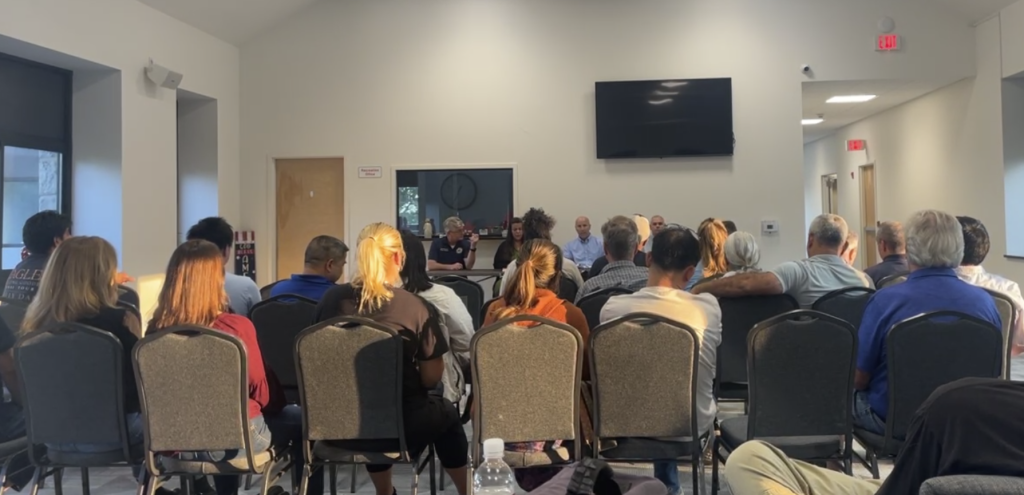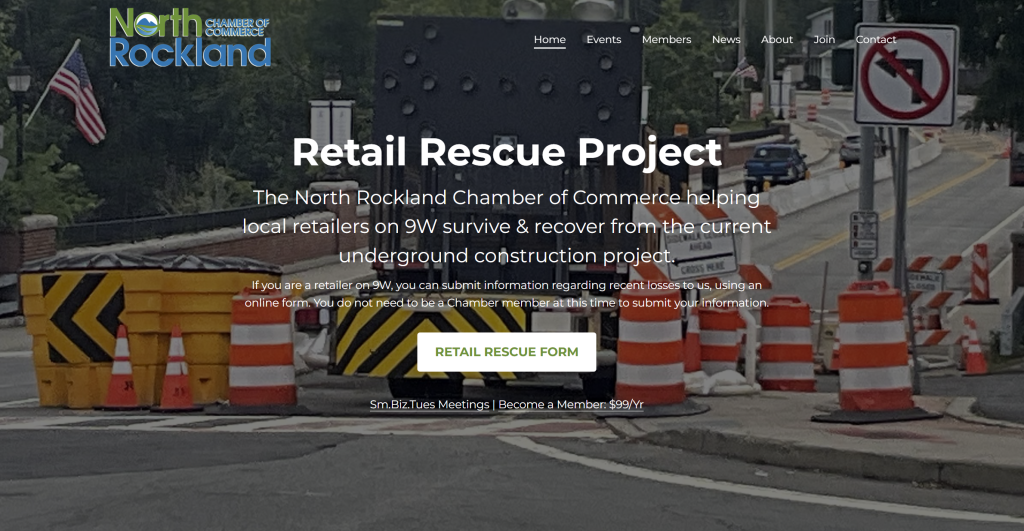
By Kim Anderson
Stony Point, NY — What was once anticipated as a carefully coordinated power project for New York City, has spiraled into what small business owners along Route 9W call an economic crisis for small businesses, as the Champlain Hudson Power Express (CHPE) pipeline installation on Route 9W continues to grind through Stony Point and Haverstraw.
Frustration was clear at last night’s Town meeting, where local business owners, public officials, and chamber representatives gathered to address the mounting losses and lack of meaningful relief.

“This is not what we were promised,” said Stony Point Supervisor Jim Monaghan, summarizing the widespread disappointment, and the remittance he requested. “I asked for $5 million,” – in a response to a local attendee who asked what Town officials are doing.
Once New York State green-lighted the CHPE project – and mandated by law that that no municipality stand in the way of construction – initial plans from the pipeline developers indicated that construction would occur overnight to minimize disruption.
However, business owners and residents now report continuous daytime work, blocked access, lost parking, and plummeting revenues—especially for service-oriented businesses dependent on drive-by traffic. “We have no authority to stop work. However, we are in constant communication with them. Sometimes they are responsive, sometimes they are not.”
A CHPE spokesperson, in response to Rockland News’ request for comment, issued the following statement:
In addition to the previously established $31 million dollar community benefit fund that CHPE negotiated with public officials to offset resident and business impacts, CHPE has also committed an additional $150,000 to the North Rockland Chamber of Commerce for a fund to help support small businesses and the Chamber has committed to working directly with businesses to accurately assess any financial impacts associated with our work in Stony Point and to fairly distribute those funds. Additionally, as requested by public officials and business owners, we have shifted several segments of the gas line relocation work to overnight hours.
Daytime and Nighttime Construction Strangles Retail Traffic

The CHPE project is a $6 billion energy initiative designed to deliver clean power to New York City via underground cables. The project was in various stages of planning for over 15 years, with original designs running through North Rockland via the Hudson River, or alternately next to the CSX train tracks – not on 9W.
In previous FAQ releases from CHPE, the company indicated that daytime work is due to O&R requiring the relocation of a gas line that is adjacent to the energy line that is being installed. The energy line itself is approximately one foot in diameter, based on several meetings that CHPE held in 2024. In those meetings, CHPE did state that the work would largely occur at nighttime.
However, CSX and local environmental advocates prevented the original plan from being implemented. The final plan settled on 9W as the only remaining choice.
To compensate, CHPE has been paying various municipalities affected by the construction – Stony Point, Haverstraw and Clarkstown – to the tune of $31 million in total. According to Town officials, this money cannot be legally used to pay local businesses, at least directly.
The North Rockland Chamber of Commerce, along with reported fiscal agent the Rockland Community Foundation, has stepped in to offer a solution: establish a separate fund that CHPE can legally use for payments, with a fiscal agent, which the Chamber can then use to provide payments to local suffering business owners:
The Chamber, led by Stephanie Melowsky, has begun the process of documenting the actual financial damage, and lobbying for financial support. CHPE initially offered $100,000 to the Chamber for affected businesses—a figure quickly deemed insufficient. After recent pressure over the past month, the amount was raised to $150,000, but with currently a reported 40 to 60 businesses impacted, it’s barely a token gesture. “That wouldn’t even cover one business’s water bill for a month,” one business owner remarked.
Multiple Meetings, Slow Progress
Meanwhile, the project has left a trail of chaos in North Rockland over the summer. One fitness center owner – Titan Fitness Gym in Haverstraw reported losing her parking lot access already for over a year, incurring monthly rent above $14,000 and overhead exceeding $30,000. “We’ve canceled evening classes. Our members are parking on the grass,” she said. “And $2,000 isn’t going to save my business.”
Further, widespread reports of several local commercial property owners being paid hundreds of thousands of dollars for easements, have not resulted in any relief for the tenants. One local business owner, who spoke with Rockland News on a condition of anonymity, said “The property owners don’t care. As a matter of fact, if we protest to them, they can evict the tenants here, and then they actually make more money based on the tax breaks they get during the vacancy.”
Supervisor Monaghan, Deputy Supervisor Amy Conklin-Stamm, and local legislators asserted to meetings attendees that they held multiple update meetings with Orange and Rockland, CHPE, and state agencies, attempting to navigate the tangle of jurisdictions and responsibilities. Still, their authority is limited. “This is a state project,” Monaghan emphasized. “The town has no authority over it.”
Local Assemblyman Chris Eachus and Senators Pete Harckham and Bill Weber have expressed concern and pledged to help, but available resources remain scarce. “There’s nothing in our current offices to distribute,” Harckham admitted, urging affected businesses to contact his office for assistance in navigating state departments.

Calls for Class Action Lawsuit
Meanwhile, community frustration continues to grow. At the meeting, one attendee proposed federal intervention, suggesting that the economic impact mirrors that of a natural disaster. “When we have a hurricane, businesses get SBA loans. Why not here?” another asked. The idea of involving the FBI or the Army Corps of Engineers was even floated by one local resident, citing alleged regulatory violations and public safety concerns.
While public officials continue to push for increased funding, some residents began calling for legal recourse. “Lawyer up and class action,” Kevin Nolan suggested, arguing that the disruption to local commerce may qualify for compensation under state or federal code violations—especially where emergency access has been obstructed.
Former North Rockland Business Alliance president Luanne Konopko, recalled previous successful campaigns to reclaim funds in North Rockland. “When Mirant filed its tax certiorari, we got $5 million in state aid for the school district. It took petitions, testimonials, and getting to the governor’s office.”
Online Form Available for Local Businesses
The Chamber has established an online form for business owners to submit estimates of their losses, but as of the meeting, only 25 submissions had been received. Additional North Rockland Chamber Board members such as Mari-Morrison Rodriguez and Rocky Alexander have physically walked the Route 9W corridor, trying to raise awareness and gather data, but with limited volunteers and growing demand, they ae publicly urge business owners to take initiative.
“This isn’t just about numbers,” said Melowsky. “It’s about proving the depth of the damage so we can ask for what’s truly needed.”
Many business owners expressed anger at having to “prove” their losses when it was clear that other entities—such as utility companies, property owners and developers—received compensation in advance. “Why are the people actually affected left to fight for scraps?” asked one frustrated gym owner.
“We don’t want to see a single business close,” said Eachus. “We’re fighting every day, but we need your help. Call. Email. Let your voices be heard.”
An attendee responded, “That’s why we’re here. Consider this your phone call.”


